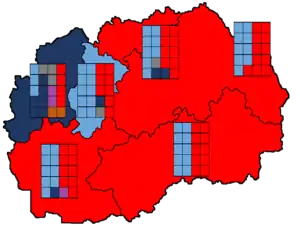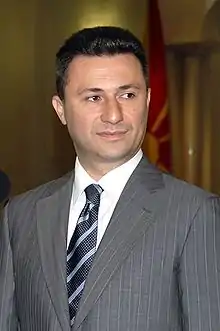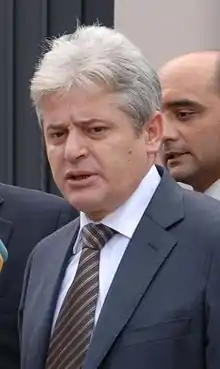2016 Macedonian parliamentary election
Early parliamentary elections were held in Macedonia on 11 December 2016,[1] having originally been planned for 24 April and later 5 June.[2] The Electoral Commission called a re-run for 25 December 2016 in Tearce and Gostivar,[3] though in Gostivar it was called off after the VMRO-DPMNE filed a lawsuit against the decision,[4] and in Tearce the outcome was unchanged.[5]
| |||||||||||||||||||||||||||||||||||||||||||||||||||||||||||
All 120 seats to the Sobranie 61 seats needed for a majority | |||||||||||||||||||||||||||||||||||||||||||||||||||||||||||
|---|---|---|---|---|---|---|---|---|---|---|---|---|---|---|---|---|---|---|---|---|---|---|---|---|---|---|---|---|---|---|---|---|---|---|---|---|---|---|---|---|---|---|---|---|---|---|---|---|---|---|---|---|---|---|---|---|---|---|---|
| |||||||||||||||||||||||||||||||||||||||||||||||||||||||||||
 Results by constituencies and mandates allocated in each VMRO-DPMNE SDSM DUI BESA Alliance for Albanians DPA | |||||||||||||||||||||||||||||||||||||||||||||||||||||||||||
| |||||||||||||||||||||||||||||||||||||||||||||||||||||||||||
 |
|---|
| This article is part of a series on the politics and government of North Macedonia |
|
|
Although VMRO-DPMNE attempted to form a coalition with BDI, coalition talks broke down in late January 2017.[6] After that, the SDSM pursued informal coalition talks with the BDI, though as of late February 2017, coalition talks were frozen on the usage of the Albanian language.[7]
Background
The elections were called as part of an agreement brokered by the European Union to end the protests against the government of Nikola Gruevski.[8] The demonstrations were sparked by the wiretapping scandal involving high ranking politicians and security personnel.[9] From 20 October 2015, a transitional government was installed including the two main parties, VMRO-DPMNE and the Social Democratic Union (SDSM). A new special prosecutor was appointed to investigate Prime Minister Nikola Gruevski and government ministers. According to the Przino Agreement signed in mid-December 2015, Gruevski was required to resign as Prime Minister 120 days before the elections. Assembly speaker Trajko Veljanovski confirmed the date on 18 October.[1]
Electoral system
Of the 123 seats in the Assembly of the Republic, 120 are elected from six 20-seat constituencies in Macedonia using closed list proportional representation, with seats allocated using the d'Hondt method. The remaining three members are elected by Macedonians living abroad.[10][11] However, the overseas seats would only be validated if the candidates won enough votes. As they did not, the seats were not awarded.
Results
| Party | Votes | % | Seats | +/– | |
|---|---|---|---|---|---|
| VMRO-DPMNE coalition | 454,577 | 39.39 | 51 | −10 | |
| Social Democratic Union coalition | 436,981 | 37.87 | 49 | +15 | |
| Democratic Union for Integration | 86,796 | 7.52 | 10 | −9 | |
| Besa Movement | 57,868 | 5.01 | 5 | New | |
| Alliance for Albanians | 35,121 | 3.04 | 3 | New | |
| Democratic Party of Albanians | 30,964 | 2.68 | 2 | −5 | |
| "VMRO for Macedonia" coalition | 24,524 | 2.13 | 0 | 0 | |
| The Left | 12,120 | 1.05 | 0 | New | |
| "CCJ–Third Block" coalition | 10,028 | 0.87 | 0 | New | |
| Liberal Party | 3,840 | 0.33 | 0 | 0 | |
| Party for Democratic Prosperity | 1,143 | 0.10 | 0 | 0 | |
| Invalid/blank votes | 37,870 | – | – | – | |
| Total | 1,191,832 | 100 | 120 | −3 | |
| Registered voters/turnout | 1,784,416 | 66.79 | – | – | |
| Source: SEC | |||||
References
- Macedonia sets December 11 for snap elections Press TV, 18 October 2016
- Statement by Commissioner Hahn and MEPs Vajgl, Howitt and Kukan: Agreement in Skopje to overcome political crisis European Commission, 15 July 2015
- "Macedonia: With Revote at Polling Station on Sunday, Distribution of Mandates Depends on Vote Count Independent.mk, 21 December 2016". Archived from the original on 27 December 2016. Retrieved 21 December 2016.
- "VMRO-DPMNE's Lawsuit Accepted, There is No Re-Run in Gostivar!". CIVIL. 21 December 2016. (in Macedonian)
- "CIVIL's Preliminary Report on Election Rerun in Tearce". CIVIL. 26 December 2016.
- "Macedonia's political crisis continues as conservatives fail to form coalition". Deutsche Welle. AP, dpa, Reuters. 30 January 2017. Retrieved 2 February 2017.
- Sinisa Jakov Marusic (20 February 2017). "Macedonia Govt Talks Stuck Over Albanian Language Demands". Balkan Insight. Retrieved 20 February 2017.
- Macedonia unrest: EU brokers plan for early elections BBC News, 2 June 2015
- Macedonia: Special Prosecutor Wins Standoff Over Wiretap Evidence OCCRP
- "ODIHR Election Observation Mission Final Report". www.osce.org. Retrieved 5 December 2019..
- Electoral system IPU


